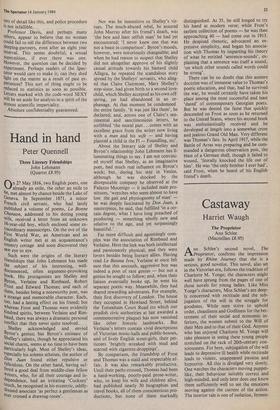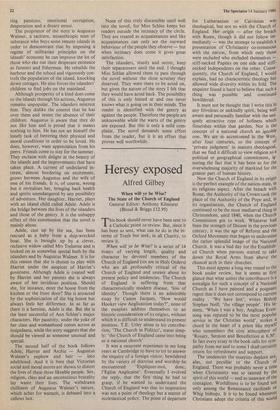Castaway
Harriet Waugh
The Proprietor Ann Schlee (Macmillan £8.95)
Ann Schlee's second novel, The Proprietor, confirms the impression made by Rhine Journey that she is a serious, good novelist. This novel, also set in the Victorian era, follows the tradition of Charlotte M. Yonge; the characters might well have sprung from the pages of one of those novels for young ladies. Like Miss Yonge's characters, Miss Schlee's are deep- ly concerned with rectitude and the sub- jugation of the will in the struggle for goodness. While men strive to uphold order, cleanliness and Godliness for the bet- terment of their social and economic in- feriors, the women submit to the Will of their Men and to that of their God. Anyone who has enjoyed Charlotte M. Yonge will take pleasure in seeing these young people stretched on the rack of 20th-century con- sciousness. For here, subjugation of the will leads to depressive ill health while rectitude leads to violent, unappeased passion and hypocrisy. All this is divulged very slowly. One watches the characters moving puppet- like, their behaviour suitably correct and high-minded, and only later does one know them sufficiently well to see the emotions moving against the current of the action. The interior tale is one of isolation, fermen-
ting passions, emotional corruption, desperation and a dreary ennui.
The proprietor of the story is Augustus Walmer, a taciturn, misanthropic man of substance who buys some remote islands in order to demonstrate that by imposing a regime of utilitarian principles on the islands' economy he can improve the lot of those who eke out their desperate existence as farmers and fishermen. He rebuilds the harbour and the school and vigorously con- trols the population of the island, knocking down cottages. He also forces the islanders' children to find jobs on the mainland.
Although prosperity of a kind does come to the islands through his actions, Augustus remains unpopular. The islanders mistrust him. They dislike the control that he has over them and resent the absence of their children. Augustus is aware that they do not like him and is proud that it means nothing to him. He has not set himself the lonely task of bettering their physical and moral conditions in order to be loved. He does, however, want appreciation from his peers. Friends come to stay for the summer. They exclaim with delight at the beauty of the islands and the improvements that have taken place. A current of undeclared in- terest, almost bordering on excitement, grows between Augustus and the wife of one of his friends. It is, of course, wrong but it revitalises her, bringing back health and spirits unendangered by any possibility of adventure. Her daughter, Harriet, plays with an island child called Adele. Adele is the bridge between the lives of the islanders and those of the gentry. It is the unhappy effect of this communion that the novel is mainly about.
Adele, cast up by the sea, has been rescued as a baby from a ship-wrecked boat. She is brought up by a clever, reclusive widow called Mrs Treherne and is looked on as somewhat special both by the islanders and by Augustus Walmer. It is for this reason that she is chosen to play with Harriet under the auspices of Harriet's governess. Although Adele is treated well by Harriet and her parents she is always aware of her invidious position. Should she, for instance, enter the house from the kitchen or the front door? She is attracted by the sophistication of the big house but always feels her difference. In as far as there is a heroine, Adele is she. But she is the least successful of Ann Schlee's major characters. Her passivity, under the yoke of her class and womanhood comes across as insipidness, while the story suggests that she should be viewed as someone unusual and special.
The second half of the book follows Adele, Harriet and Archie — Augustus Walmer's nephew and heir — into adulthood. And it is here that Victorian social and moral mores are shown to distort the lives of these three likeable people. Sex, religion, class and an unconscious brutality lay waste their lives. The withdrawn chilliness of Augustus Walmer's nature, which aches for warmth, is debased into a callous lust. None of this truly discernible until well into the novel, for Miss Schlee keeps her readers outside the intimacy of the circle. They are treated as acquaintances and like acquaintances can only see the outward behaviour of the people they observe — but when intimacy does come it gives great satisfaction.
The islanders, sturdy and secret, keep their separateness until the end. I thought Miss Schlee allowed them to pass through the novel without the close scrutiny they deserved. They were there to be acted on, but given the nature of the story I felt that they would have acted back. The possibility of this is only hinted at and one never knows what is going on in their minds. The reader is identified with the gentry as against the people. Therefore the people are unknowable while the warts of the gentry are exposed. But this is only a mild com- plaint. The novel demands some effort from the reader, but it is an effort that proves well worthwhile.







































 Previous page
Previous page